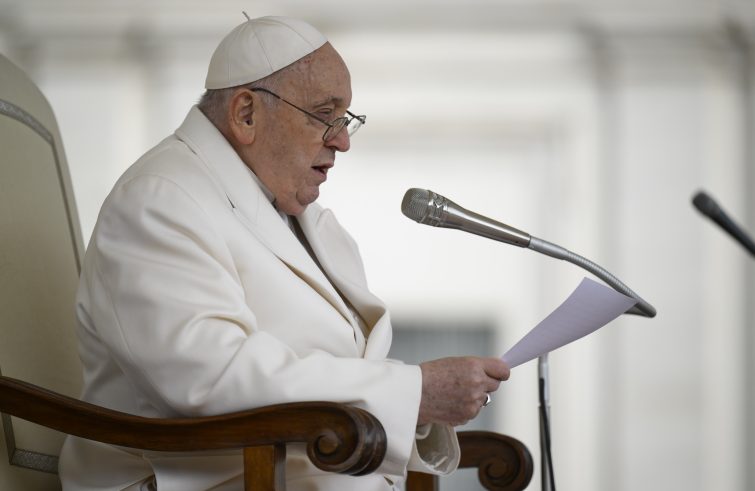
“Let us never forget, war is always a defeat, it must not continue! We must make every effort to negotiate an end to the war. Let us pray for this.” Pope Francis closed the general audience in St. Peter’s Square today with this appeal, resuming his remarks after having entrusted the reading of the catechesis – dedicated to the virtue of prudence – and the greetings in the various languages to Father Pierluigi Giroli. “Yesterday we celebrated the feast of St Joseph, Patron of the Universal Church,” the Pope said in his greetings to the Italian-speaking faithful: “Together with you, I wish to entrust to his patronage the Church and the whole world, especially all fathers for whom he is a unique role model.” “To Saint Joseph we entrust the war-torn peoples of Ukraine and the Holy Land, Palestine and Israel, who suffer so terribly from the horrors of war,” he continued: “Let us never forget, war is always a defeat. The war must not continue! We must make every effort to negotiate an end to the war. Let us pray for this.”
Prudence – the Pope explains in the written text with regard to one of the four cardinal virtues, along with justice, fortitude and temperance, “is not the virtue of the timorous person, always hesitant about what action to take. No, this is a mistaken interpretation. It is not even merely caution. Granting primacy to prudence means that the action of man is in the hands of his intelligence and freedom.”
“The prudent person is creative”, Francis went on to illustrate: “He or she reasons, evaluates, tries to understand the complexity of reality and does not allow him- or herself to be overwhelmed by emotions, idleness, pressures and illusions.”
“In a world dominated by appearances, by superficial thoughts, by the triviality of both good and bad, the ancient lesson of prudence deserves to be revived”, the Pope’s appeal: “It is the capacity to govern actions in order to direct them towards good; for this reason, it is dubbed the ‘coachman of the virtues’”.
“Prudent are those who are able to choose – Francis notes – as long as it remains in the books, life is always easy, but in the midst of the wind and waves of daily life it is another matter; often we are uncertain and do not know which way to go.” “The prudent do not choose by chance”, the Pope points out: first of all, they know what they want, then they weigh up the situations, seek advice, and with a broad outlook and inner freedom, they choose which path to embark upon.” “That is not to say they do not make mistakes: after all, we are all human; but at least they avoid major setbacks.” Francis denounced: “Unfortunately, in every environment there is someone who tends to dismiss problems with superficial jokes, or to incite controversy.
Prudence is instead the quality of those who are called to govern:
they know that to administer is difficult, that there are many points of view and one must try to harmonize them, that one must do not the good of some but of all. Prudence also teaches that, as they say, ‘the perfect is the enemy of the good.’ Indeed, too much zeal in some situations can cause disasters: it can ruin a construction that would have needed gradualness; it can give rise to conflicts and misunderstandings; it can even trigger violence.” Finally, the prudent person “knows how to safeguard the memory of the past, not out of fear for the future, but because he or she knows that tradition is a patrimony of wisdom.” “Life is made up of a constant overlapping of old and new things, and it is not good always to think that the world begins with us, that we have to deal with problems starting from scratch”, the recommendation: “And the prudent person is also prescient. Once one has decided on the goal to strive for, it is necessary to obtain all the means to reach it.” “The Christian life is a combination of simplicity and shrewdness”, the Pope concludes: “Preparing His disciples for the mission, Jesus recommends: ‘Behold, I send you out as sheep in the midst of wolves; so be wise as serpents and innocent as doves.’ As if to say that
God does not only want us to be saints, He wants us to be intelligent saints, because without prudence, taking the wrong path is a moment’s mistake!”











